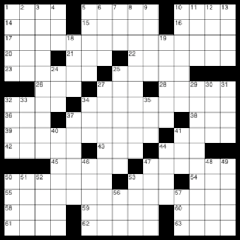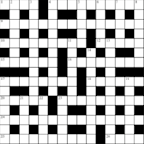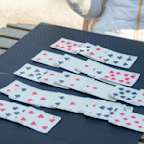Search results
Results From The WOW.Com Content Network
The New York Times’ latest puzzle combines a word search with a crossword. Joining puzzle fans' morning rotations of the crossword, Wordle, and Connections is Strands, the New York Times' latest ...
On 18 August 1942, a day before the Dieppe raid, 'Dieppe' appeared as an answer in The Daily Telegraph crossword (set on 17 August 1942) (clued "French port"), causing a security alarm. The War Office suspected that the crossword had been used to pass intelligence to the enemy and called upon Lord Tweedsmuir, then a senior intelligence officer ...
Website. www .nytimes .com /crosswords. The New York Times Crossword (marketed as The Crossword) is a daily American-style crossword puzzle published in The New York Times, syndicated to more than 300 other newspapers and journals, and released online on the newspaper's website and mobile apps as part of The New York Times Games.
A 15x15 lattice-style grid is common for cryptic crosswords. A cryptic crossword is a crossword puzzle in which each clue is a word puzzle. Cryptic crosswords are particularly popular in the United Kingdom, where they originated, as well as Ireland, the Netherlands, and in several Commonwealth nations, including Australia, Canada, India, Kenya, Malta, New Zealand, and South Africa.
The abbreviation is not always a short form of the word used in the clue. For example: "Knight" for N (the symbol used in chess notation) Taking this one stage further, the clue word can hint at the word or words to be abbreviated rather than giving the word itself. For example: "About" for C or CA (for "circa"), or RE.
A crossword (or crossword puzzle) is a word game consisting of a grid of black and white squares, into which solvers enter words or phrases ("entries") crossing each other horizontally ("across") and vertically ("down") according to a set of clues. Each white square is typically filled with one letter, while the black squares are used to ...
Fill-Ins, also known as Fill-It-Ins or Word Fill-Ins, are a variation of the common crossword puzzle in which words, rather than clues, are given, and the solver must work out where to place them. Fill-Ins are common in puzzle magazines along with word searches, cryptograms, and other logic puzzles.
Verbs constitute one of the main parts of speech (word classes) in the English language. Like other types of words in the language, English verbs are not heavily inflected. Most combinations of tense, aspect, mood and voice are expressed periphrastically, using constructions with auxiliary verbs . Generally, the only inflected forms of an ...
Microsoft Puzzle Hunt. The Microsoft Puzzlehunt is a quasi-annual Microsoft tradition started in 1999. It is a puzzlehunt in the same vein as the MIT Mystery Hunt and has some similarity to The Game. The hunt is a team puzzle competition which challenges each team to solve a large number of original puzzles of all different kinds.
Psalter world map, ca. 1260. Jerusalem is at the centre of the map; the Red Sea can be seen coloured red at upper right of the globe. The Psalter World Map or the Map Psalter is a small mappa mundi from the 13th century, now in the British Library, found in a psalter. No other records of psalters found from the Middle Ages have a mappa mundi. [1]








